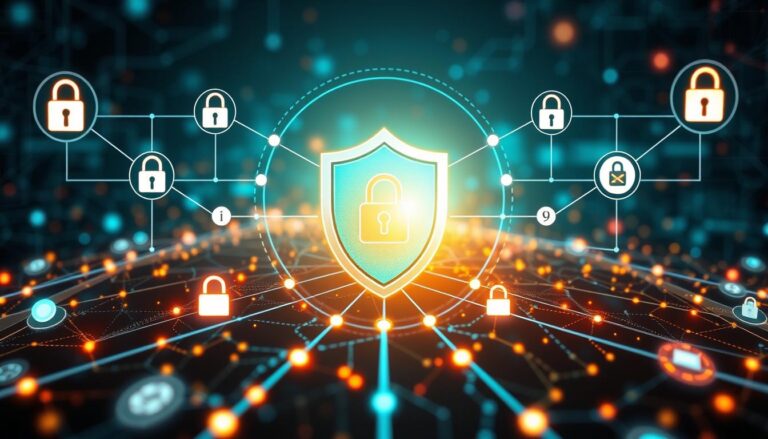
A building with a security sign at the entrance
If you’re pursuing a career in cybersecurity or IT, you’ve likely heard of Security+ certification. Offered by CompTIA, Security+ is a globally-recognized certification that demonstrates your proficiency in various aspects of IT security, including network security, cryptography, identity management, and more. And, conveniently enough, North Laurel, MD is home to several quality Security+ training and certification providers.
Why Security+ Training and Certification is Important for Your Career
IT security is a constantly-evolving field, with new threats and vulnerabilities emerging every day. As a result, cybersecurity professionals must stay up-to-date with the latest security measures and techniques. Security+ certification demonstrates to employers that you have the knowledge and skills to help protect their networks and data from potential threats. Additionally, Security+ certification is often a prerequisite for more advanced certifications like CISSP or CISM. So, obtaining Security+ certification can open new doors to career advancement and higher salaries.
Moreover, Security+ certification is recognized globally and is vendor-neutral, meaning that it is not tied to any specific technology or product. This makes it a valuable credential for professionals working in various industries and sectors. It also shows that you have a broad understanding of security concepts and principles, which can be applied to different environments and situations. With Security+ certification, you can demonstrate your commitment to your profession and your willingness to invest in your own professional development.
The Benefits of Security+ Certification
In addition to improved job opportunities and higher salaries, Security+ certification provides several other benefits. For example, Security+ certification holders can often qualify for government and defense-industry jobs, which often require such certifications. Additionally, Security+ certification is vendor-neutral, meaning that it provides a broad understanding of IT security concepts that can be applied to a variety of environments rather than just focusing on one vendor’s products.
Another benefit of Security+ certification is that it demonstrates a commitment to ongoing professional development. To maintain the certification, individuals must complete continuing education activities and pass a recertification exam every three years. This ensures that Security+ certified professionals stay up-to-date with the latest security trends and technologies, making them valuable assets to their organizations.
Tips for Preparing for the Security+ Exam
The Security+ exam is a comprehensive test of your IT security knowledge, covering numerous topics and concepts. To prepare for the exam, you should start by reviewing the exam objectives, which are provided by CompTIA. You should also consider taking a Security+ training course, which can provide you with hands-on experience and further understanding of the exam material. Finally, it’s important to practice with Security+ exam practice questions and simulations to become comfortable with the format and structure of the exam.
Another important aspect of preparing for the Security+ exam is to stay up-to-date with the latest security trends and technologies. This can be done by reading industry publications, attending security conferences, and participating in online forums and discussions. By staying informed, you can ensure that you have a comprehensive understanding of the current security landscape and are better equipped to answer exam questions.
It’s also important to manage your time effectively when preparing for the Security+ exam. Create a study schedule that allows you to cover all the exam objectives and topics, while also giving yourself enough time to review and practice. Avoid cramming or studying for long periods without breaks, as this can lead to burnout and decreased retention of information. By managing your time effectively, you can approach the exam with confidence and a clear mind.
How to Choose the Right Security+ Training Course
When choosing a Security+ training course, it’s important to consider several factors. First, make sure that the course is taught by a qualified instructor with extensive industry experience. Look for courses that provide hands-on experience and simulations to help you apply the concepts you’re learning. Consider the course materials as well; are they up-to-date and aligned with the latest exam objectives? Finally, take into account the course location and format – do you want to take a live in-person course, or an online course that you can complete at your own pace?
Another important factor to consider when choosing a Security+ training course is the level of support provided by the course provider. Look for courses that offer access to a knowledgeable support team that can answer your questions and provide guidance throughout the course. Additionally, consider the availability of practice exams and study materials to help you prepare for the certification exam.
It’s also worth researching the reputation of the course provider before making a decision. Look for reviews and testimonials from past students to get an idea of their experiences with the course. You may also want to consider the cost of the course and whether it fits within your budget, but keep in mind that the cheapest option may not always be the best choice.
A Guide to Security+ Certification Exam Format and Structure
The Security+ exam consists of 90 multiple-choice and performance-based questions, and lasts for 90 minutes. The exam is administered through Pearson VUE testing centers or through an online proctored format. The exam covers topics such as threat management, cryptography, identity and access management, and more. To pass the exam, you must receive a score of 750 or higher (on a scale of 100-900).
It is important to note that the Security+ certification is recognized globally and is highly valued in the IT industry. The certification is designed to validate the skills and knowledge required for a career in IT security, and is often a requirement for many job positions in the field.
Additionally, the Security+ exam is updated every three years to ensure that it remains relevant and up-to-date with the latest industry trends and technologies. This means that candidates must stay current with the latest developments in IT security in order to maintain their certification.
Key Topics Covered in Security+ Training
Security+ training covers a wide range of IT security topics and concepts, including but not limited to: network security, wireless security, cryptography, identity and access management, compliance and operational security, and incident response. Additionally, training may cover best practices for risk management, enterprise security architecture design, cloud security, and more. Each of these topics is essential to the overall Security+ certification process and is designed to equip you with the knowledge and skills you need to succeed on the exam and in your cybersecurity career.
One important aspect of Security+ training is the emphasis on staying up-to-date with the latest security threats and trends. This includes learning about emerging technologies and their potential security risks, as well as understanding the current threat landscape and how to mitigate risks. By staying informed and proactive, Security+ certified professionals are better equipped to protect their organizations from cyber attacks and other security breaches.
The Best Study Materials for Security+ Certification
To prepare for the Security+ exam, you’ll need access to quality study materials. The CompTIA Security+ Study Guide is a comprehensive resource that covers all exam objectives and provides practice questions and simulations. Additionally, video courses and practice exams are available through several online training providers. Finally, CompTIA’s online community forums provide a wealth of information and support from other Security+ certification candidates and certified professionals.
It’s important to note that hands-on experience is also crucial for success on the Security+ exam. Consider setting up a virtual lab environment to practice configuring and securing networks, as well as implementing security measures on various operating systems. Many online training providers offer virtual labs as part of their course offerings, or you can set up your own using virtualization software such as VirtualBox or VMware.
How to Maintain Your Security+ Certification
Once you’ve obtained your Security+ certification, it’s essential to maintain the certification by earning continuing education units (CEUs). CEUs demonstrate that you’re staying up-to-date with the latest IT security concepts and techniques. You can earn CEUs by attending Security+ training events, participating in online webinars, or engaging in other professional development activities. CompTIA requires that Security+ certification holders renew their certification every three years by earning a certain number of CEUs.
It’s important to note that not all professional development activities count towards earning CEUs. CompTIA has specific guidelines for what qualifies as a CEU-eligible activity. For example, attending a conference or seminar may only count for a certain number of CEUs, while completing a self-paced online course may count for a different amount. It’s important to carefully review the guidelines and track your CEUs to ensure that you’re meeting the requirements for certification renewal.
Real Life Applications of Security+ Certification
Security+ certification is a valuable asset in a variety of IT roles and industries. For example, Security+ certification can be particularly useful for IT security analysts, network administrators, cybersecurity specialists, or anyone who works with sensitive data. Additionally, government and defense contractors often require their employees to hold Security+ certification. In a world where IT security threats are becoming more and more prevalent, obtaining Security+ certification can set you up for a successful and rewarding career in the IT security field.
Moreover, Security+ certification can also be beneficial for individuals who work in the healthcare industry. With the increasing use of electronic health records and the need to protect patient information, healthcare organizations are looking for professionals who have a strong understanding of IT security. Security+ certification can demonstrate to potential employers that you have the necessary skills and knowledge to protect sensitive healthcare data.
Furthermore, Security+ certification can also be useful for individuals who work in the financial industry. Financial institutions deal with large amounts of sensitive data, including personal and financial information of their clients. Security+ certification can help professionals in this industry to understand the latest security threats and implement effective security measures to protect their organization’s data and reputation.



